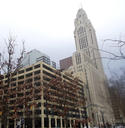Another period of singing the virtues of Chinese Communist Party (CCP) direction seems upon us, at least when it comes to steering an economy. Just as after the Great Recession of 2008-9, China’s rebound from the Coronavirus Covid-19 has led the world. Of course, the official statistics always bear scrutiny, and public debt levels probably lend a false note to stimulus measures. But a 4.9% growth rate in third-quarter GDP looked great. read more »
Planning
China Rediscovers Rural Life (Cue Applause)
- Login to post comments
New Zealand Adopts Texas MUDs
New Zealand home prices are among the highest in the world relative to incomes and rents, with the capital city of Auckland having a median home price of $830k and a house price to income median multiple of 8.6 – in contrast to Houston’s far more affordable 3.6 - as documented in the Annual Demographia International Housing Affordability Survey. These prices have been growing at one of the fastest rates in the OCED: 266% since 1991. read more »
Latest Data Shows Pre-Pandemic Suburban/Exurban Population Gains
The latest complete American Community Survey (ACS) data, analyzed by the Demographia City Sector Model, indicates that population growth in the nation’s 53 major metropolitan areas (over 1,000,000 residents) continues to be, even before the pandemic, overwhelmingly suburban and exurban. read more »
- Login to post comments
NIMBYs Are Making More Noise Than Wind Turbines
There is increasing concern that electricity generation from fossil fuels contributes to climate change and air pollution. In response to these concerns, governments around the world are encouraging the installation of intermittent electricity generation projects including Industrial Wind Turbines (IWT’s). read more »
- Login to post comments
High Density and Sustainability
The proponents of currently fashionable planning doctrines favouring density maintain, among other factors, that high-density planning is more environmentally sustainable. Policies based on these doctrines are being applied in Australian capital cities--- Canberra, Sydney, Melbourne, Adelaide, Brisbane, Perth and to some extent Darwin and Hobart.
The assumption that high-density is environmentally superior seems to be based on intuition as no proof is provided to support this claim. Rather, considerable evidence is emerging that this is not the case. read more »
- Login to post comments
Joe Biden's Tired Old Infrastructure Plan
The infrastructure plan recently released by the Biden campaign is a collection of tired ideas that have consistently failed in the past. Too much of the plan is based on last year’s groupthink and not enough of the plan recognizes the new realities that have emerged from the pandemic. read more »
- Login to post comments
Poor City, Rich Suburb: A Defining Characteristic of the Rust Belt
We all know that for decades the suburbia narrative was one of homogenized, sprawled and insulated wealth separated from diverse, dense and isolated poverty. We also know that's changed dramatically over the last 30-40 years. But that distinction really first became codified in the development patterns of cities that boomed in the late 19th/early 20th century: coincidentally, when Rust Belt cities boomed. read more »
- Login to post comments
CSY Repost: The Community and Economic Development Hierarchy
I've spent many, many years of my career working to improve the economic development prospects of communities. Wanting to make a meaningful, positive contribution to the revitalization of cities is what pushed me into this career path. More to the point, I've spent a good deal of that time working in places that were facing stiff economic headwinds working against them. read more »
- Login to post comments
The Challenge of Revitalizing Urban Boulevards
One of the toughest challenges in real estate is revitalizing urban boulevards. There are dozens of plans for remaking these, but very few of these plans have actually sparked much private investment back of the curb line, and the reason is that in most cases these streets are simply so big and busy that people don't want to live or shop along them. It's time to use a new strategy, one of building at right angles to them, and of re-attaching underused land to the surrounding neighborhoods. read more »
- Login to post comments
What's So Magic About $1 Trillion
News reports say that the Trump Administration is going to propose a $1 trillion infrastructure plan to “boost the economy.” One writer says it will not only promote recovery but also help the environment. read more »
- Login to post comments






















